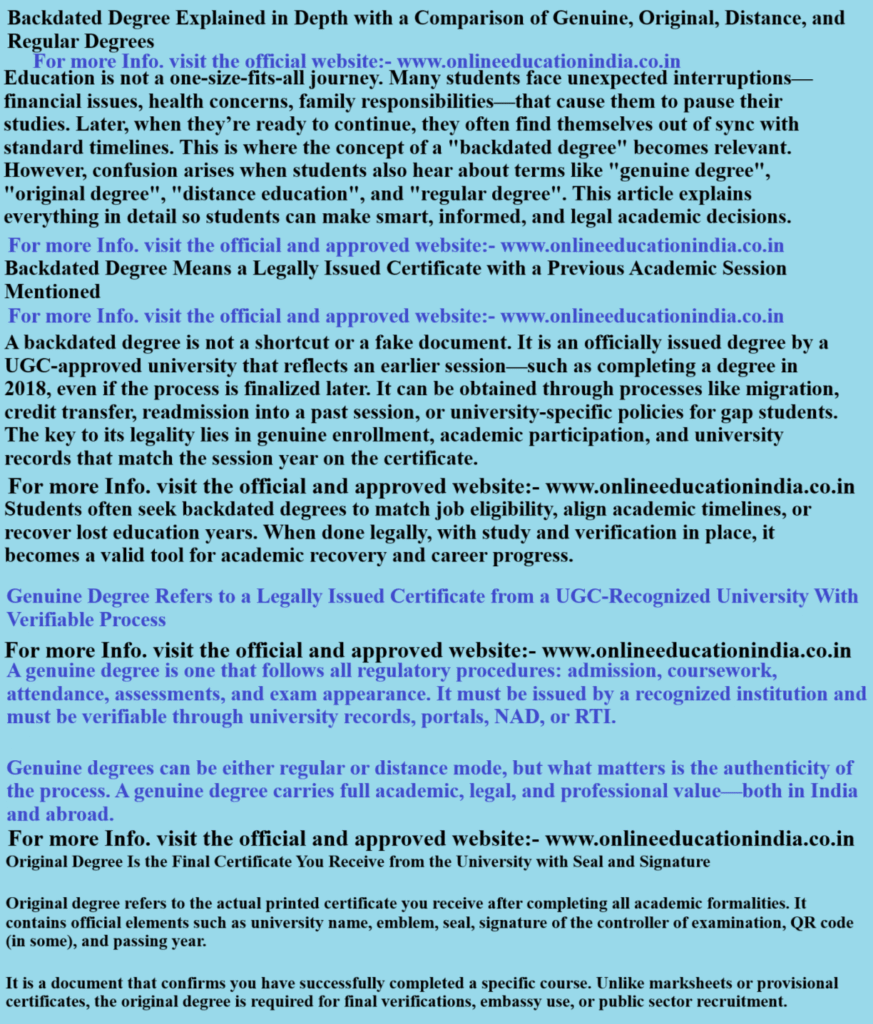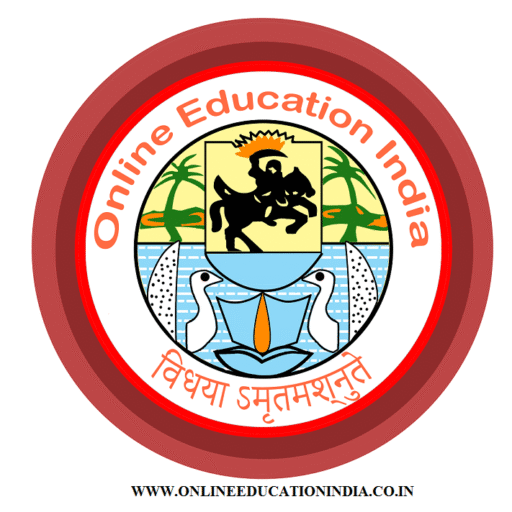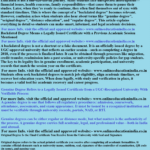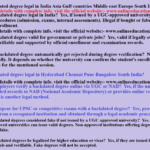Education is not a one-size-fits-all journey. Many students face unexpected interruptions—financial issues, health concerns, family responsibilities—that cause them to pause their studies. Later, when they’re ready to continue, they often find themselves out of sync with standard timelines. This is where the concept of a “backdated degree” becomes relevant. However, confusion arises when students also hear about terms like “genuine degree”, “original degree”, “distance education”, and “regular degree”. This article explains everything in detail so students can make smart, informed, and legal academic decisions.
Backdated Degree Means a Legally Issued Certificate with a Previous Academic Session Mentioned
A backdated degree is not a shortcut or a fake document. It is an officially issued degree by a UGC-approved university that reflects an earlier session—such as completing a degree in 2018, even if the process is finalized later. It can be obtained through processes like migration, credit transfer, readmission into a past session, or university-specific policies for gap students. The key to its legality lies in genuine enrollment, academic participation, and university records that match the session year on the certificate.
Students often seek backdated degrees to match job eligibility, align academic timelines, or recover lost education years. When done legally, with study and verification in place, it becomes a valid tool for academic recovery and career progress.
Genuine Degree Refers to a Legally Issued Certificate from a UGC-Recognized University With Verifiable Process
A genuine degree is one that follows all regulatory procedures: admission, coursework, attendance, assessments, and exam appearance. It must be issued by a recognized institution and must be verifiable through university records, portals, NAD, or RTI.
Genuine degrees can be either regular or distance mode, but what matters is the authenticity of the process. A genuine degree carries full academic, legal, and professional value—both in India and abroad.
Original Degree Is the Final Certificate You Receive from the University with Seal and Signature
Original degree refers to the actual printed certificate you receive after completing all academic formalities. It contains official elements such as university name, emblem, seal, signature of the controller of examination, QR code (in some), and passing year.
It is a document that confirms you have successfully completed a specific course. Unlike marksheets or provisional certificates, the original degree is required for final verifications, embassy use, or public sector recruitment.
Regular Degree Means Attending Full-Time Classes on Campus with a Structured Curriculum
A regular degree involves attending classes on a daily or semester-wise schedule within a physical university or college. Attendance, internal marks, lab work, and in-person exams are essential elements of this format.
This is often preferred in India for disciplines like engineering, medical, law, and teaching. Many government jobs or professional courses (like GATE, NET) prefer or require regular degrees from accredited institutions.
Distance Degree Is Obtained Through Remote Learning Without Mandatory Classroom Attendance
Distance education allows students to pursue a course remotely, often via online or postal material, while fulfilling the academic requirements such as projects, assignments, and exams.
Approved by UGC-DEB, these degrees are valid and especially beneficial for working professionals, housewives, or students in remote locations. Universities like IGNOU, VMOU, and others provide credible distance learning options.
Backdated Degree Must Not Be Confused with a Fake or Purchased Degree Without Academic Involvement
There is a huge difference between a legally backdated degree and a fake, purchased document. A fake degree may look real but has no university enrollment, exam record, or digital verification. Students must avoid such degrees as they are illegal and career-damaging.
On the other hand, a backdated degree obtained through a transparent and academic process carries full legal validity. Always verify the issuing university on ugc.ac.in, check for NAAC accreditation, and ask for enrollment proof.
Comparison – Understanding the Key Differences Between All Types of Degrees
Genuine Degree vs. Fake Degree
- Genuine: UGC-approved, process-driven, traceable, accepted by employers and embassies
- Fake: No admission process, not verifiable, carries legal risk, can lead to blacklisting
Original Degree vs. Provisional Certificate
- Original: Final document, needed for jobs, attestation, permanent record
- Provisional: Temporary certificate issued before the original, valid for short-term uses
Regular Degree vs. Distance Degree
- Regular: On-campus, full-time, structured
- Distance: Remote learning, flexible timing, ideal for working individuals
Backdated Degree vs. Shortcut Degree (Illegal)
- Backdated: Issued for past session legally, includes study & verification
- Shortcut: Bought without process, no study or records, leads to trouble
Key Advice for Students Seeking Backdated or Alternative Degrees
Follow Only Legal Methods Through Recognized Institutions
Make sure the university is UGC-listed and provides enrollment ID, study material, and exam schedule. No genuine degree is ever issued without your participation.
Ask Questions Before Trusting a Consultant or Admission Service
Always ask for university name, admission proof, and process outline. Check if they are transparent about documentation and time frame.
Choose Degree Mode Based on Your Career Needs and Flexibility
If you’re working full-time, distance education may help. If you plan to pursue government jobs or further studies, regular or verified backdated options are better.
Keep Records and Verification Documents for Life
Store your degree, mark sheets, exam roll number, hall tickets, and enrollment letters. These help during background checks and legal uses.
Final Words – Choose Knowledg
e Over Shortcuts, Legality Over Speed
The Indian education system is evolving, and legal pathways like backdated sessions, distance education, and credit-based re-admissions are now more structured and student-friendly. The key is to respect the process. Earning a degree should never be about paperwork—it should be about growth, credibility, and readiness for your career.
Never buy, never forge. Learn, apply, and succeed.







